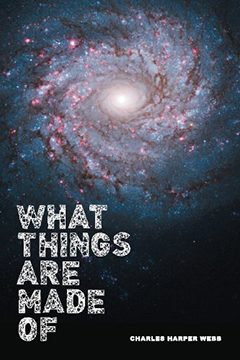Verdad Magazine Volume 15
Fall 2013, Volume 15
Poetry by Charles Harper Webb
Spinners
Don't say these dolphins leap and twist
to shake off parasites. Don't say they crash
simply to stun some anchovy or smelt,
then bolt the body down. Don't say
their triple Tsukahara's are only exuberance
of slaughter, elation at feeding
and/or sexual success, frothing over
into loops, flips, pirouettes. Don't say
this cruise-ship auctioneer fakes
taking frantic calls, jabbing a cell
phone at his helpers, snarling, “Say
the auction's started. She's too late!”
Don’t say his Rembrandts, Matisses,
Chagalls are prints embellished
with purple rodomontade; his quips—
“Grand larceny! Call the cops!”—
reference his fees. Let us believe
his spirit whirls and twists and spiels
from sheer exhilaration at the greatness
he is blessed to place in homes like ours
at prices which really are “a steal.”
Call Bright Smile
Imagine: sparkling white teeth in just one visit!
Wonderful to yawn and feel the sheen
blaze off incisors bright enough
to start prairie fires, signal
cavalry, lure women (fluttering)
to the klieg-light of my smile.
And not just women. Scintillating
so, I’ll surge ahead at work.
One radiant word, and men will fall
prostrate, awaiting my commands.
They'll fight to buy me lunch,
take me to ball games, get me in
their country clubs, and pay my dues.
Yellow teeth get sent to jail.
Yellow teeth get the form-letter in the mail.
Yellow teeth get passed over,
and bless the foot that kicks them out.
No more jaundice-mouth for me!
No more feigned sadness to avoid disgusting
others with a grin. I’ll charge ahead in my new life
like a team of thirty-two spelunkers,
lanterns all agleam.
Kid Fight
The words that yellowjacket in
from right field, raise hot welts
on Erik’s brain—words aimed
at him and his friends, who seem
linked to him by invisible skin.
The words sting worse
because the one releasing them
defiles the game—can’t catch,
throw, or hit the small white sun
that Erik orbits night and day.
“Aiden!” he screams, just
like his coaches do. “Get
your head back in the game.”
“Fuck you, asshole,” Aiden rages—
unjust as school-yard “monitors”
with their yellow slips and parent
conferences. Still, Erik cages
his temper (hissing, chittering)
until the last out. Then, despite
what grownups say—“Violence
is failure. Violence is wrong”—
when Aiden runs in, clowning,
from where no balls ever go,
Erik kicks open the cage.
Blood-famished, maddened
by restraint, his penned-up anger
bolts for its prey. “Coach!
Help!” Aiden squeals, tries
to run, then, in a puff of dust,
goes down.
I Love Her So Madly
want so much to please, that when she complains of my leaving dandruff on the sheets, whiskers in the sink, pee on the toilet seat, I build a large black plastic cube to live inside.
Five pin-sized air-holes and a straw through which I sip protein drinks are my sole contact with the world in which my dear one shines.
I've learned to re-absorb my wastes, and will away my beard. Since, in the dark box, sweat lacquering my underarms can't gleam, and lost hairs flutter, soft as feathers, to the unseen floor, I no longer fear offending.
Still, the groans and whimpers wafting from our bed, the clink of male belts, and an intermittent scraping, makes me fear my box is edging out the door
BIO: Charles Harper Webb's latest book, What Things Are Made Of, was published by the University of Pittsburgh Press in 2013. Recipient of grants from the Whiting and Guggenheim foundations, and Editor of Stand Up Poetry: An Expanded Anthology, Webb teaches in the MFA Program in Creative Writing at California State University, Long Beach.
 What Things Are Made Of (Pitt Poetry Series) by Charles Harper Webb.
What Things Are Made Of (Pitt Poetry Series) by Charles Harper Webb.
"Charles Harper Webb is celebrated for his use of humor; yet even his funniest poems rise, as the best comedy must, out of deep human drives, sorrows, and needs. Powerful immersions in what it means to be human, these poems explore the spectrum of emotions from love to hate, tenderness to brutality. They can be withering and vulnerable in the same breath. Models of clarity and vividness, they are mysterious when they need to be, ranging from lyric to narrative, from realism to wild surreal flights, powered by a fierce, compassionate intelligence. Metaphors of startling aptness and originality, a voice at once endearing and provocative, high musicality, propulsive energy, wild imaginative leaps, as well as mastery of diction from lyricism to street-speak, create a reading experience of the first order. Uniformly fun to read, these poems go down easy, but pack a wallop. As Robert Frost said poetry should do, What Things Are Made Of "begins in delight and ends in wisdom"
